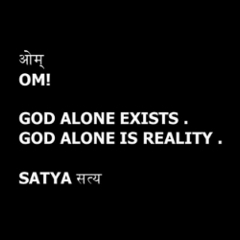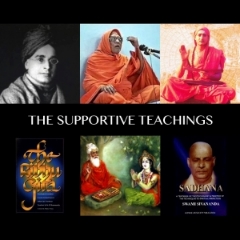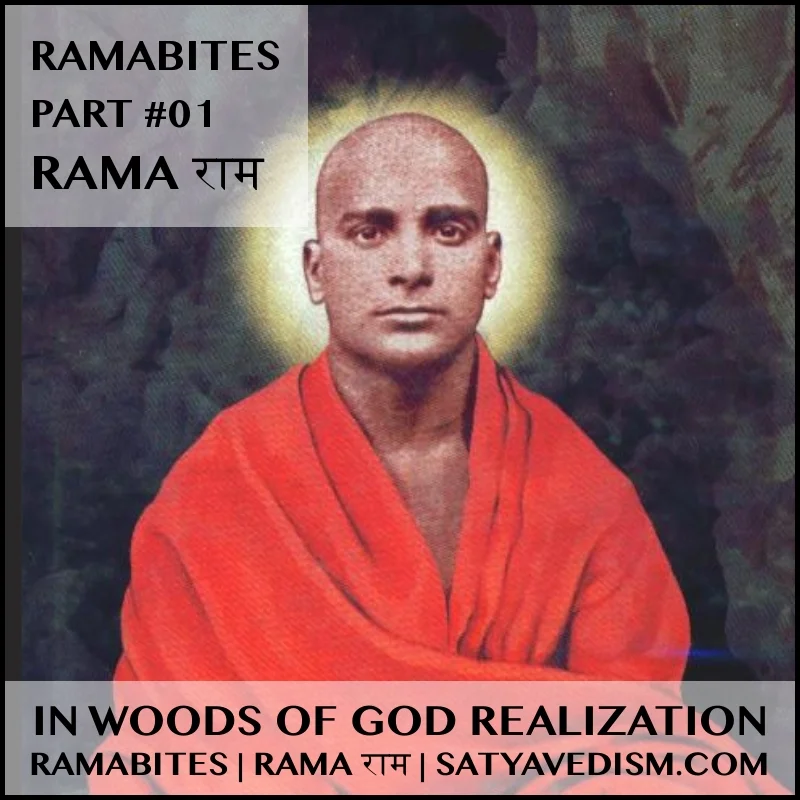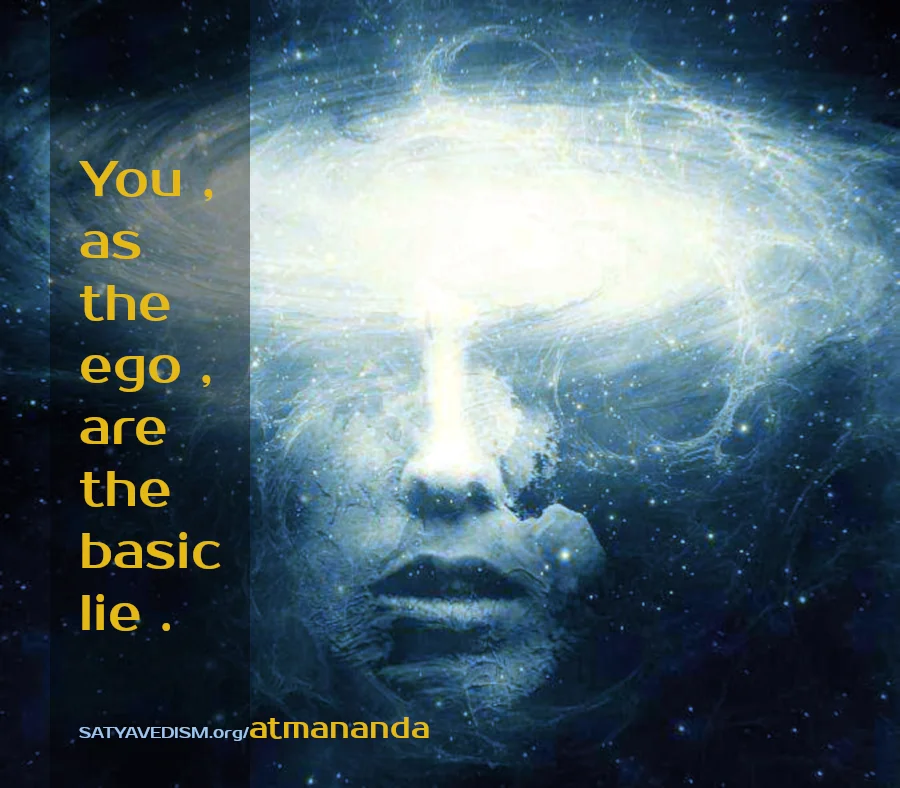BRHADARANYAKA UPANISAD | 4.4.22 | PT 2 | AMOETD
| | homeBRHADARANYAKA UPANISAD | 4.4.22 | SRI SANKARACARYA
|| PART 2 ||
Because of the assertion , " Desiring this world alone " , we understand that those who seek the three external worlds * are not entitled to the monastic life , for an inhabitant of the region of Banaras who wishes to reach Hardwar * does not travel eastward . Therefore , for those who desire the three external worlds , progeny , rites and meditation on the conditioned Brahman are the means , since the Sruti says ,
" This world of humans is to be won through progeny alone , and by no other rite " , etc ( I . v . 16 ) . Hence those who want them should not reject such means as progeny and embrace the monastic life , for it is not a means to them . Therefore the assertion , " Desiring this world alone monks renounce their homes " , is quite in order .
The attainment of the world of the Self is but living in one's own Self after the cessation of ignorance . Therefore , should a person desire that world of the Self , for one the chief and direct means of that would be the withdrawal from all activities , just as progeny and the like are the means of the three external worlds ; for such acts as would secure the birth of a child , and so on , are not means to the attainment of the Self .
And we have already mentioned the contradiction involved in them on the ground of impossibility . Therefore , desiring to attain the world of the Self , they do renounce their homes , that is to say , must abstain from all rites . Just as for one seeking the three external worlds , a child and so forth are enjoined as the requisite means , so for one who has known about Brahman and desires to realise the world of the Self , the monastic life consisting in the cessation of all desires is undoubtedly enjoined .
Why do those seekers after the world of the Self particularly renounce their homes ? The text gives the reason in the form of a laudatory passage . This is the reason for that monastic life : The ancient sages , ancient knowers of the Self , it is said , did not desire children , as also rites and the meditation on the conditioned Brahman . — The word " children " suggests all these three means to the three external worlds . — In other words , they did not try for children etc as means to those three worlds .
It may be objected that they must practise the meditation on the conditioned Brahman , since they could renounce desires on the strength of that alone . The answer is : No , because it is excluded . To be explicit : In the passages , The Brahmana ousts one who knows one as different from the Self ( II . iv . 6 ; IV . v . 7 ) , and " All ousts one " , etc ( Ibid ) , even the meditation on the conditioned Brahman is excluded , for this Brahman too is included in the word " all " .
AIso , " Where one sees nothing else " , etc ( Ch . VII . xxiv . 1 ) . Also because it has been forbidden to see in Brahman differences about prior or posterior , and interior or exterior , in the passage , " Without prior or posterior , without interior or exterior " ( II . v . 19 ) . And , " Then what should one see , . . . know , and through what ? " ( II . iv . 14 ; IV . v . 15 ) . Therefore there is no other reason for the renunciation of desires except the realisation of the Self .
What was their intention ? They thought :
' What object or result shall we achieve through the instrumentality of children , for they are definitely known to be the means of attaining an external world , and that world does not exist apart from our own Self , since everything is our own Self , and we are the Self of everything ; and just because It is our Self , It cannot be produced , attained , modified or improved by any means .
Acts that purify the performer of sacrifices to the Self merely concern one's identification with the body and organs , for the Sruti speaks of the relation between the whole and part , etc . , regarding them , " This particular part of my body is being purified by this ( rite ) " , etc . ( S . XI . 11 . vi . 13 ) . One who sees the Self as Pure Intelligence , homogeneous and without a break cannot meditate upon purification or improvement based on a relation between the whole and part .
Therefore we shall achieve nothing through means such as children . It is only the ignorant person who has to attain results through them . Because one who sees water in a mirage proceeds to drink from it , another who sees no water there , but a desert , cannot certainly be so inclined . Similarly we who see the Truth , the world of the Self , cannot run after things to be achieved through children etc — things that are like a mirage and so forth , and are the objects of the defective vision of ignorant people ' .
This was their idea .
This is expressed as follows : We beholders of the Truth , who have attained this Self that is free from hunger etc and is not to be modified by good or bad deeds , this world , this desired result . There are no means to be desired for realising this Self that is free from all such relative attributes as ends and means . It is only with regard to a thing which is attainable that means are looked for . If a search is made for means to secure something that is unattainable , it would be like swimming on land under the impression that it is water , or like looking for the footprints of birds in the sky .
Therefore the knowers of Brahman , after realising this Self , should only renounce their homes , and not engage in rites ; because the ancient knowers of Brahman , knowing this , did not want children . What they did after condemning this dealing with the world of ends and means as being the concern of the ignorant , is being described : They , it is said , renounced their desire for progeny , for wealth and for the worlds , and lived a mendicant life , etc . All this has been explained ( III . v . i ) .
Therefore , desiring the world of the Self monks renounce their homes , i.e. should renounce . Thus it is an injunction , and harmonises with the eulogy ( that follows ) . The sentence , which , is provided with a eulogy ( immediately after ) , cannot itself have the force of glorifying the world of the Self , for the verb " renounce " has for its eulogy the succeeding passage , " This is ( the reason ) " , etc . If the previous sentence were a eulogy , it would not require another eulogy ; but the verb " renounce " ( as interpreted above ) does require the eulogy , " This is ( the reason ) " , etc .
Because ancient sages , desisting from rites directed towards obtaining children etc . , did renounce their homes , therefore people of to-day also renounce them , i.e. should renounce them . If we thus construe the passage , the verb " renounce " cannot have the force of glorifying the world of the Self . We have explained this ( III . v . 1 ) on the ground that the verb is connected by the Sruti with the same subject as that of " knowing " .
Moreover , the verb " renounce " is here used along with " the study of the Vedas " , etc . As the study of the Vedas and other such acts , which have been enjoined as means to the realisation of the Self , are to be taken literally , and not as eulogies , so also the renunciation of home , which has been mentioned along with them as a means to the attainment of the world of the Self , cannot be a eulogy . Besides , a distinction in the results has been made by the Sruti .
The words , " Knowing * It — this world of the Self — alone " ( this text ) , divide the Self as a result distinct from the other results , the external worlds , as a similar division has been made in the passage , " This world is to be won through progeny alone , and by no other rite ; the world of the Manes through rites " ( I . vi . 16 , adapted ) . Nor is the verb " renounce " eulogistic of the world of the Self , as if this were something already known . Besides , like a principal sacrifice , it itself requires a eulogy . Moreover , were it a eulogy it would occur in the text only once * . Therefore it is purely a mistake to consider it as a tribute to the world of the Self .
Nor can renunciation as an act to be performed be regarded as a eulogy . If , in spite of its being such an act , it is considered to be a eulogy , then rites such as the new and full moon sacrifices , which are to be performed , would also become eulogies . Nor is renunciation clearly known to have been enjoined elsewhere outside of the present topic , in which case it might be construed here as being eulogistic .
If , however , renunciation be supposed to be enjoined anywhere , it should primarily be here ; it is not possible anywhere else . If , again , renunciation is conceded to be enjoined on those who are not qualified for any rite , in that case acts such as the climbing of trees may also be considered as equally appropriate injunctions , for both are alike unknown as obligatory under the circumstances . Therefore there is not the least chance of the passage in question being a eulogy .
It may be asked : If this world of the Self alone is desired , why do they not undertake work as a means to its attainment ? What is the good of renunciation ? The answer is : Because this world of the Self has no connection with work . That Self , desiring which they should renounce their homes , is not connected , either as a means or as an end , with any of the four kinds of work , viz those that are produced , etc ( p . 448 ) . Therefore this self is That which has been described as " Not this , not this " ; It is imperceptible , for it is never perceived , etc — this is the description of the Self .
Since it has been established through scriptural evidence as well as reasoning , specially in this dialogue between Janaka and Yajnavalkya , that the Self as described above is not connected with work , its results and its means , is different from all relative attributes , beyond hunger etc , devoid of grossness and so on , birthless , undecaying , immortal , undying , beyond fear , by nature homogeneous Intelligence like a lump of salt , self-effulgent , one only without a second , without prior or posterior , and without interior or exterior — therefore after this Self is known as one's own Self work can no more be done . Hence the Self is undifferentiated .
One who has eyes surely does not fall into a well or on thorns while going along the way . Besides , the entire results of work are included in those of knowledge . And no wise one takes pains for a thing that can be had without any effort .
" If one gets honey near at hand , why go to a mountain for it ? If the desired object is already attained , what sensible person would struggle for it ? " The Gita too says , " All work , O Arjuna , together with its factors is finished with the attainment of knowledge " ( IV . 33 ) .
Here also ( IV . iii . 32 ) it has been stated that all other beings live on particles of this very Supreme Bliss that is accessible to the knower of Brahman . Hence the latter cannot undertake work .
Because this sage , desisting from all desires , after realising the Atman that has been described as " Not this , not this " as one's own Self , lives identified with That , therefore it is but proper — these words are to be supplied to complete the sentence — that one who has this knowledge and is identified with that Self is never overtaken by these two thoughts that are just going to be mentioned .
Which are they ? The following ones : " I did an evil act for this reason , for example , the maintenance of the body . Oh , my action was wretched . This sinful act will take me to hell " .
This repentance that comes to one who has done something wrong , does not overtake this sage who has become identified with the Self , described as " Not this , not this " . Similarly " I did a good act , such as the performance of a sacrifice or charity , for this reason , owing to the desire for results . So I shall enjoy the happiness that comes of it in another body " .
This joy also does not overtake one . One , this knower of Brahman , conquers both of them , both these actions , good and bad . Thus for a monk who has known Brahman , both kinds of action , whether done in the past or in the present life , are destroyed , and no new ones are undertaken . Also , things done , such as the regular rites , or those very things not done — the omission of them — do not trouble one .
It is the one who is ignorant of the Self that is troubled by the actions done , by having to receive their results , and by those not done , by being visited with their adverse consequences . But this knower of Brahman burns all work to ashes with the fire of Self-knowledge . As the Smrti says , " Just as a blazing fire ( burns ) the fuel ( to ashes ) " , etc . ( G . IV . 37 ) . As to those actions that caused the present body , they are worked out through actual experience . Hence the knower of Brahman has no connection with work .
( NOTES : * From here up to " worlds apart " , the results accruing to one who realises one's identity with Brahman are being described . | * The reference is to Bhartrprapafica . | * Which include among others the Upanisads . | * The earth , the world of the Manes and heaven . | * Which lies at the north . | * The renunciation in question follows this indirect knowledge so as to mature it into actual realisation . | * As a matter of fact , there are several verbs in the passage that repeat the idea . )
|| UPADESA SAHASRI : A METHOD OF ENLIGHTENING THE DISCIPLE || I.I.6 || COMPLETE AMOETD SERIES ➤➤ | INTRODUCTION ➤➤ ||
|| THIS SCRIPTURE SERIES SOURCE || ➤
|| 1 || http://www.SATYAVEDISM.com ||
|| 2 || http://bit.ly/SRIADISHANKARA ||
http://www.SATYAVEDISM.com/shankara/amoetd/
SOURCE | SATYAVEDISM.ORG


































































































